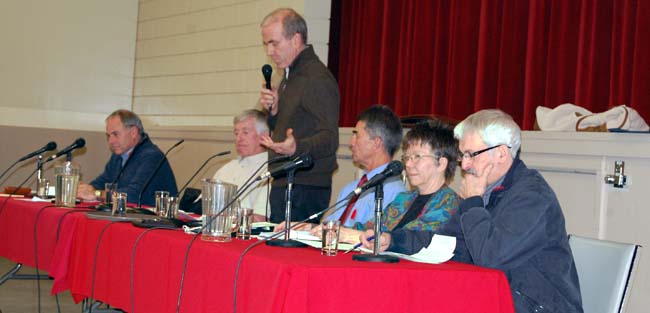
By David F. Rooney
Taxation, as expected, was the major focus of discussion at Wednesday evening’s Town Hall meeting at the Community Centre.
“If there’s a problem and you think there’s a solution tell us what it is,” Councillor Chris Johnston told members of the business community who complained about the tax burden.
But there were no immediate solutions proposed, though there could well be other ways to structure taxation.
And some solution must be found — ideally sooner rather than later.
Business taxes amount to about $9 per square feet of business space in town. That added expense, and it is unlikely to decline, makes running a business difficult and forces some to simply fold.
As Roxy Theatre owner and Coldewell Banker real estate agency proprietor Carl Rankin pointed out: “We’re not open for business. It doesn’t make any sense.”
But Council’s response to the complaints from him, Jason Roe, Brydon Roe and others seemed to be a default-mode-only “we can cut services (a move it believes residents do not favour) or raise taxes.”
Still, the meeting attended by about 65 people was valuable. If nothing else it provided, in the words of Mayor David Raven, “an open discussion” of issues that impact the entire community.
“The format is new,” Raven said. “The dialogue is new. We’ll be as open as we can.”
All members of City Council except Steve Bender (he was in Ontario for his father-in-law’s funeral) were present for the meeting, as were senior municipal officials. Each Councillor spoke briefly about his portfolio — Phil Welock, public works; Chris Johnston, planning and bylaw enforcement; Peter Frew, finance on behalf of Steve Bender, and economic development; Antoinette Halberstadt, environmental and social development and; Tony Scarcella, Parks, Recreation and Culture. And then people were invited to raise those issues that concerned them.
Three people had submitted statements that were read into the record by Mayor Raven. One, from a bed and breakfast owner, informed Council that a Bed & Breakfast Association is being formed and would it please take their views into consideration once that process is completed. Tony Morabito said in a letter that while he doesn’t use cosmetic pesticides he is opposed to any attempt to compel private citizens to forgo their use.
As expected by many Stuart Andrews raised the Westside gravel pit issue and asked if Council would now oppose Interoute’s plans to expand its operation in light of a laboratory analysis that says the aggregate it is crushing is 75.8 per cent silicon dioxide. It also contains minerals that are known carcinogens and toxins, including arsenic, cadmium, strontium and cesium.
Council had asked Interoute to provide it with a laboratory analysis of the gravel it is mining. Andrews was sent a copy of the report more than two weeks ago and he provided The Current with a copy of it (click here to read the story). However, Mayor Raven said the City has not yet seen the report.
“We’ll get the report, do an analysis of it and decide what to do at that time,” he said, before asking Andrews to refrain from asking any more questions on that issue.
James Walford was keen to find out what Council thinks a curb-side recycling program would cost citizens. Council had already balked at an original estimate of $100 a year on top of the levy for regular garbage pick up. And Councillors Phil Welock, Chris Johnston and Antoinette Halberstadt made it clear that there is no appetite for introducing a compulsory system that is going to cost residents an arm and a leg.
“There’s a cost to being environmental,” Johnston said. “That’s a choice the public will have to make.”
But the real meat of the evening was taxation and spending.
The City is $13 million in debt and that is expected to rise to $15 million by the end of the year. This debt has been incurred by the City’s program of infrastructure renewal. Decades of ignoring the slow deterioration of roads, sidewalks and subterranean water and sewer pipes have caught up with Revelstoke and the City is trying to correct that. But it is very expensive, even when you consider that the province and the federal government have assumed 30 per cent each of four of the major infrastructure programs the city has undertaken in the last couple of years. These include the Clearview Heights sanitary sewer system, the Track Street East water and sewer installation and the Downie Street lift station.
Although homeowners in Clearview Heights are bearing part of the cost, too, for their portion, those projects as well as others projected for future years mean that, unless someone can wave a magic wand, local residents and businesses will be forced to bear the lion’s share of the cost through taxation, service fees and other mechanisms.
The City is not exactly being spendthrift. It has hired an outside consultant to look at better cost-recovery methods and, as Phil Welock said, “it will do only what it can afford.” And if it can find other ways to tighten its belt, it will.
Tony Scarcella told the crowd that he thinks the City must “work smarter” and be more efficient, comments that drew applause.
Other Town Hall meetings are planned for the future and Council will be meeting with members of the Chamber of Commerce on November 23.
In the meantime, local residents who have workable ideas or comments on these issues should communicate them. Council is open to suggestion.



